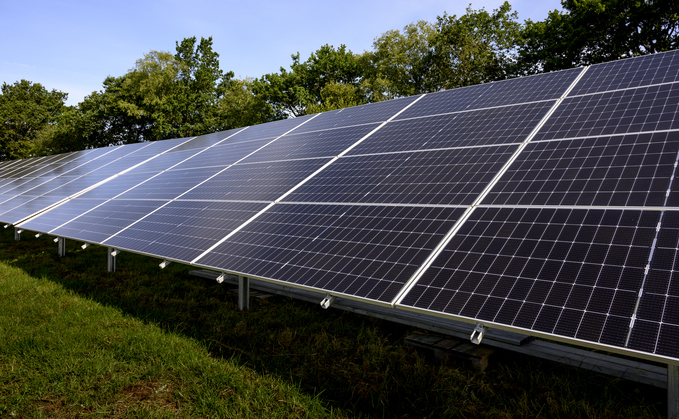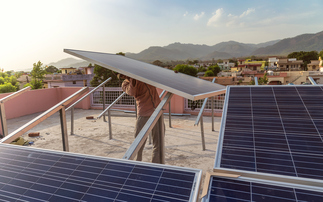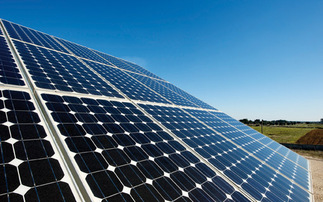
The government's latest attempt to restrict solar farm development will undermine energy security and do next to nothing to improve food security - it amounts to little more than blatant electioneering
Just two weeks ago Energy Security and Net Zero Secretary Claire Coutinho delivered a thoughtful - if protest-marred - speech setting out the overarching philosophy she brought to the task of decarbonising the UK's economy.
Statist interventions and red tape were counterproductive, she argued, and innovation and market-led policies represented a much more effective route forward. The UK faced a stark choice at the next election, Coutinho insisted, between embracing the uncertainty that is "one of the key stimulants of risk and product development" and "an ever-increasing and narrowing set of targets, where government dictates outputs and prices, and a net zero leviathan of central planning crushes our brilliant enterprise economy".
A fortnight later, and following public lobbying from Tory MPs in what used to be True Blue safe seats across rural England, Coutinho has decided the leviathan of central planning should rouse itself and try and crush the next wave of solar farms.
No one expects ideological consistency from politicians anymore, especially when they are 20 points down in the polls, but do they have to be quite so shameless about it?
The first thing to say is yesterday's Written Ministerial Statement clarifying the government's stance on planning guidance for solar farms does not amount to a meaningful policy change. As the solar industry quickly pointed out, official planning guidance for new solar projects was already updated through the National Policy Statement in January. This statement simply reiterates the existing need to consider the impact of new solar farms on high grade agricultural land, minimise the clustering together of large projects, and prioritise solar development on buildings and brownfield land. The solar industry and the UK's planning committees know all of this already. If there were not an election imminent, this statement would not be happening.
The second thing to say is the concerns over solar farm development and food security are to be expected. The UK's food security is being eroded through a mix of climate impacts, trade barriers, and the highly marginal finances of many farms. Against such a backdrop, debates over land use will inevitably become ever more political, even if the impacts of the solar industry are objectively tiny. Meanwhile, lengthy delays to grid connections are incentivising solar developers to cluster projects together at points in the grid where connections can be secured, which can leave some areas facing a wave of planning applications at the same time.
But these challenges are relatively small - especially when compared to the threats posed by climate change and fossil fuel imports - and eminently surmountable. The government's decision to talk up the 'threat' posed by solar farms to food security amounts to little more than a piece of cynical electioneering that will undermine the UK's energy and climate security, while doing next to nothing to boost food security.
The problem is that planning policy may not have changed in any meaningful way (indeed some developers may even find the clarification on land-grading helpful), but the political signal sent to investors is once again that the UK government is not welcoming of clean energy development. Far from opting for a market-led approach, the central government is trying to tell farmers and landowners what to do with their own land if they dare to calculate that they can get better returns from hosting wind and solar farms than they can from growing crops or raising livestock. The UK's efforts to decarbonise will be further delayed and billpayers will have to pay for more costly forms of power generation. The leviathan of central planning lives, and it is a Tory.
The suggestion - made explicit in a social media post from Coutinho - that food and energy security are in opposition and it is food security that should be prioritised will also serve to poison the debate on this crucial topic way beyond the next election. This is a gambit designed to not just save a handful of Tory seats with 20,000-plus seat majorities in rural England, but also mobilise opposition if (when?) a Labour government tries to make good on its promise to push through radical planning reform that prioritises clean energy development.
And all for what? You could block every solar farm in the planning pipeline and it would free up considerably less land than is covered by golf courses. The impact on national food security would be so small as to be overwhelmed many times over by one below average harvest. Meanwhile, the UK would find itself more reliant on the fossil fuel imports that are driving up energy costs and carbon emissions.
A government that was really serious about food security would be focused on encouraging a shift away from highly inefficient meat and dairy heavy diets, investing in new alternative protein technologies, removing post-Brexit trade barriers and revisiting trade deals that undercut domestic production, bolstering climate resilience, tackling food waste, making sure farming subsidy reforms work as planned, re-assessing the wisdom of using energy crops for biofuels, and reviewing whether we really need so many golf courses. Restricting solar farm development would be a long, long way down the list, and should only come after an effective policy to encourage more solar development on buildings and brownfield land is actually delivered.
The government's performative crackdown on solar farm development will do next to nothing to improve food security, and to suggest otherwise is to take voters for fools. The country is indeed at a "fork in the road" when it comes to clean energy, as Coutinho characterised it. It is just that the path offered by the government is filled with potholes, policy inconsistency, and blatant politicking that threatens to undermine energy and food security alike.
A version of this article first appeared as part of BusinessGreen's Overnight Briefing email, which is available to all BusinessGreen Intelligence members.










